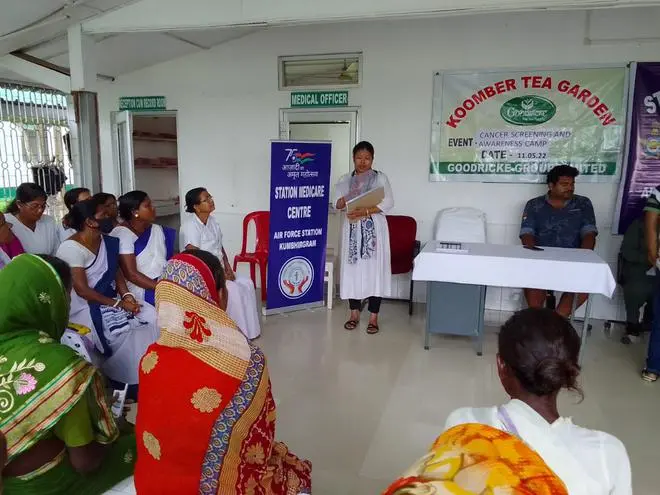Surgical oncologist Dr Ravi Kannan says he’s wiser these days and does not label new initiatives as “game changers”, until it actually delivers benefits to patients on the ground.
The doctor and his team are working to set up small clinics, possibly in a teagarden or an abandoned school, he says, to take cancer care closer to the community, along with their participation. The centres would have about 8 beds, so cancer patients including daily-wagers can take their chemotherapy, for instance, and get back to their life and work without displacing themselves or their families, explains Kannan, Director at the Cachar Cancer Hospital and Research Centre, Silchar (Assam), and a Padma Shri awardee.
Stressing on getting the community to take ownership of such initiatives, Dr Kannan attributes the award recognition to the team and community that help “bring it all together”.

Over the last 15 years, several initiatives had been introduced at their cancer centre, including providing lodging and food for patients, providing ad hoc employment and some wages, teaching skills to patients and care givers etc, to encourage patients to complete their treatment. And every time he thought the initiative was a game-changer, Dr Kannan found the number of patients completing their treatment was still below his expectation. “Now I’m wiser,” and will wait for the proof of the pudding, he says, on the small clinic initiative.
Several kilometers away, the call to take cancer care closer to the community is finding resonance in the medical community. Dr Amol Akhade, medical oncologist from Mumbai’s Nair Hospital agrees such measures help reduce the “toxic finance” that begins to add up for the patient and caregiver, if they move within or across States to get basic cancer care. District and civil hospitals can have a facility with nurses and doctors to provide chemotherapy, so patients can get back to their routines, he suggests. Akhade speaks from experience, having helped with a similar facility at Nair Hospital.
The cost of cancer treatment and drugs have been a constant concern, across Governments and they have tried to address it by facilitating train travel for cancer patients or through State and Central health insurance schemes, for example. But there’s much more to do, and sometimes it’s the small things that also add up to deliver some relief to patients, say doctors.
Seamless insurance
Akhade calls for a standardised, seamless system for State health insurances (where the centralised Ayushman Bharat programme is not available), so patients do not suffer when one State does not recognise a health insurance programme of another State.
On the diagnostics and medicines front, private hospitals need to display boards saying patients can procure drugs or get lab-tests done from any quality centre, he said, contrary to current practices where some hospitals insist everything be done in-house. This would bring down costs by 30-40 per cent, he points out.
Calling for centralised procurement of high-end therapies, Akhade says, it can be supplied to cancer hospitals across the country, similar to the method adopted with Covid-19 vaccines. If
Covid-19’s official mortality is pegged at five lakh, cancer took over 8 lakh lives, he says, stressing the need for intervention.
Care centres
In December, a member from the Indian Medical Parliamentarians Forum wrote to Prime Minister Modi, citing from a Parliamentary standing committee report that said, 40 per cent of cancer hospitalisations were financed, largely through, borrowings, sale of assets and contributions from friends and relatives. The letter called for government interventions (including through patent provisions, legally available) to make cancer drugs accessible and affordable. It also called for an expert panel to look into providing free comprehensive cancer care.
Srimayee Chakraborty, Life Sciences Partner at EY India, points to the high number of deaths among the reported cancer cases and calls for standardisation of treatment and mapping of outcomes. Echoing a suggestion made in many quarters, she says, cancer should be a notifiable disease (where treatment and death-related data is captured by the government), cancer registries updated and comprehensive cancer care centres increased across all districts.
Cancer is a multi-modal disease, managed by a combination of treatments that need to be governed by a tumour board that outlines a treatment regimen best suited for the patient, she says. Otherwise, patients end up co-paying for high-end treatment prescribed to them, but not reimbursed by health insurance, she observed.
An EY and FICCI study (October 2022) pegs reported cancer incidence in India at 19 to 20 lakhs. The real incidence is 1.5 to 3 times higher than the reported cases, the study says, underlining the need for a comprehensive and dedicated approach to managing cancer, its treatment and cost to the patient.




Comments
Comments have to be in English, and in full sentences. They cannot be abusive or personal. Please abide by our community guidelines for posting your comments.
We have migrated to a new commenting platform. If you are already a registered user of TheHindu Businessline and logged in, you may continue to engage with our articles. If you do not have an account please register and login to post comments. Users can access their older comments by logging into their accounts on Vuukle.